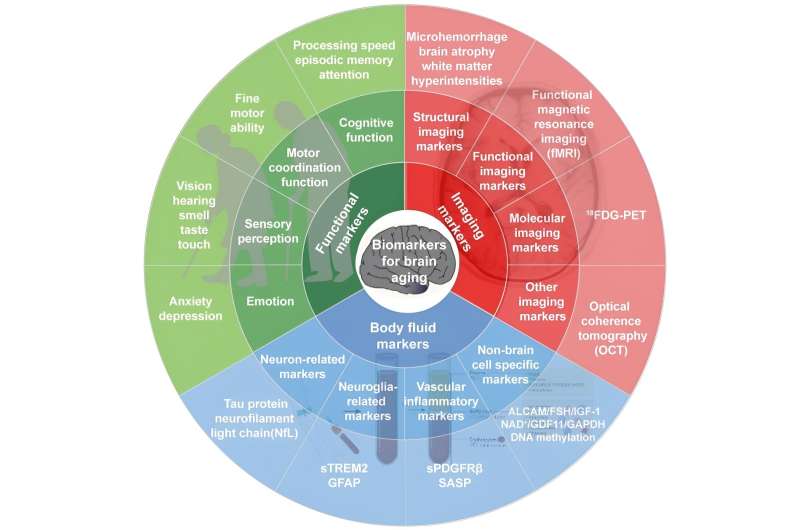This article has been reviewed according to Science X's editorial process and policies. Editors have highlighted the following attributes while ensuring the content's credibility:
fact-checked
proofread
A framework of biomarkers for brain aging

China and the world are facing severe population aging and an increasing burden of age-related diseases. Aging of the brain causes major age-related brain diseases, such as neurodegenerative diseases and stroke. Identifying biomarkers for the effective assessment of brain aging and establishing a brain aging assessment system could facilitate the development of brain aging intervention strategies and the effective prevention and treatment of aging-related brain diseases.
Thus, experts from the Aging Biomarker Consortium (ABC) have combined the latest research results and practical experience to recommend brain aging biomarkers and form an expert consensus during the seminar held on March 12, 2023 at Tongji University, aiming to provide a basis for assessing the degree of brain aging and conducting brain-aging-related research with the ultimate goal of improving the brain health of elderly individuals in both China and the world.
Biomarkers reflecting brain aging were recommended, with the aim of addressing clinical issues such as "How biologically old is the individual now?", "How fast is the individual aging?", and "How far is the individual from age-related brain diseases?" The related consensus of brain aging has been published in Life Medicine.
Brain aging involves multi-dimensional and multi-scale changes in molecules, cells, tissues, organs, the whole body, and groups of individuals. Therefore, multi-dimensional and multi-scale information needs to be integrated to accurately evaluate the state of brain aging. Brain aging biomarkers refer to markers that can accurately reflect "real age," brain structure and brain function, which can be used to determine the degree of brain aging and evaluate the effect of anti-aging interventions.
In recent years, remarkable progress has been made in exploring the biological age of the brain. Considering the accessibility and convenience of clinical procedures, this consensus screens brain aging biomarkers from the three dimensions including brain function, imaging and body fluids for reference in clinical work and follow-up studies.
Members of the ABC first identified a list of key issues related to the biomarkers for brain aging through online collaboration based on available publications and the research of the ABC members in this paper. The identified biomarkers were further discussed at a face-to-face meeting to reach a consensus.
All recommendations were fully reviewed and discussed among the members of the ABC to allow diverse perspectives and considerations for this consensus. And this consensus follows the internationally accepted conventions for expressing the level of evidence and strength of recommendations. Further validation of these markers in different age groups is needed.
More information: Yu-Juan Jia, et al, A framework of biomarkers for brain aging: a consensus statement by the Aging Biomarker Consortium, Life Medicine (2023). DOI: 10.1093/lifemedi/lnad017



















